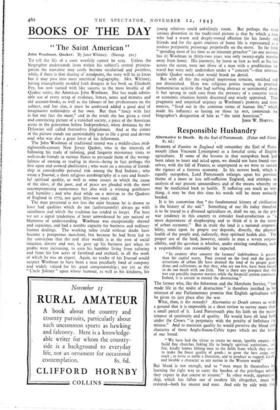BOOKS OF THE DAY
" The Saint American I I John Woolman, Quaker. By Janet Whitney. (Harrap. 2 Is.)
To tell the life of a saint worthily cannot be easy. Unless the biographer understands from within his subject's central preoccu- pation the narrative may easily become secularised and pointless, while, if there is that sharing of standpoint, the story will be in focus but it may pass into mere uncritical hagiography. Mrs. Whitney, having triumphantly avoided both dangers in her book on Elizabeth Fry, has now turned with like success to the most lovable of all Quaker saints, the American John Woolman. She has made admir- able use of every scrap of evidence, letters, notes and minutes and old account-books, as well as the labours of her predecessors on the subject, and has also, it must be confessed added a good deal of imaginative embroidery of her own. But then "fancy with fact is but one fact the more," and in the result she has given a vivid and convincing picture of a vanished society, a piece of the American scene in the generation before Independence, when denizens by the Delaware still called themselves Englishmen. And at the centre of the picture stands out unmistakably true to life a great and devout soul who was also a great lover of his fellowmen.
The John Woolman of traditional record was a middle-class mid- eighteenth-century New Jersey Quaker, who in the intervals of following his trade of tailoring, paid frequent missionary visits to well-to-do friends in various States to persuade them of the wrong- fulness of owning or trading in slaves—being in fact perhaps the first open and avowed abolitionist ; who went on a mission of friend- ship at considerable personal risk among the Red Indians ; who wrote a journal, a short religious autobiography of a rare and beauti- ful spiritual quality, as well as some essays in which the cause of the slave, of the poor, and of peace are pleaded with the most uncompromising earnestness but also with a winning gentleness and humility ; and who died while on a mission to the Quakers of England in r772, not quite fifty-two years old.
The man presented is not less the saint because he is shown to have had qualities which do not (unfortunately) always go with saintliness and which the tradition has tended to forget. For here we see a signal tenderness of heart unweakened by any naiveté or bluntness of understanding. Woolman was exceptionally shrewd and sagacious, and had a notable capacity for business and ordinary human dealings. The working tailor could without doubt have become a prosperous. merchant, but because he had been led to the conviction that the zeal after wealth is at the root of social injustice, slavery and war, he gave up his business just when its profits were increasing, to earn his humbler living from tailoring and from his few acres of farmland and orchard, in all the work of which he was an expert. Again, no reader of his journal would suspect Woolman to have been a man peculiarly fond of company and widely valued for his good companionship ; nor yet as the " Uncle Johnny " upon whose humour, as well as his kindness, his -young relatives could unfailingly count. But perhaps the most serious distortion in the traditional picture is that by which a man who had a warm and deeply-rooted affection for his family and friends and for the quiet routines of home life is represented as a restless peripatetic personage perpetually on the move. So far from " spending most of his time as an itinerant preacher " (as one account has it) Woolman in thirty-two years was only twenty-eight months away from home. His journeys, by horse or foot as well as his last across the ocean, were not those of a man with a predilection for travel but were only undertaken under a " concern "—that untrans- latable Quaker word—that would brook no denial.
But with all this the original impression remains, enriched and not diminished. Here was religious genius issuing in practical humanitarian activity that had nothing abstract or sentimental about it but sprang in each case from the pressure of a concrete social or economic situation keenly discerned and wisely appraised. This pragmatic and empirical urgency in Woolman's protests and testi- monies, " lived out in the common terms of human life," which made his influence so lasting on those he met, commends his biographer's designation of him as " the saint American."
Jimix W. HARVEY.


























 Previous page
Previous page